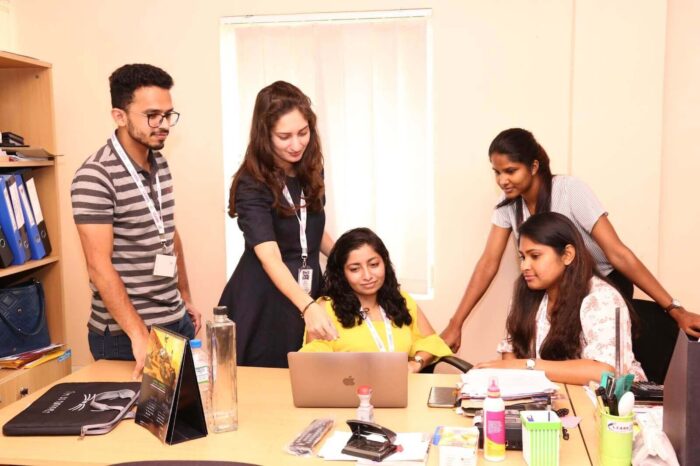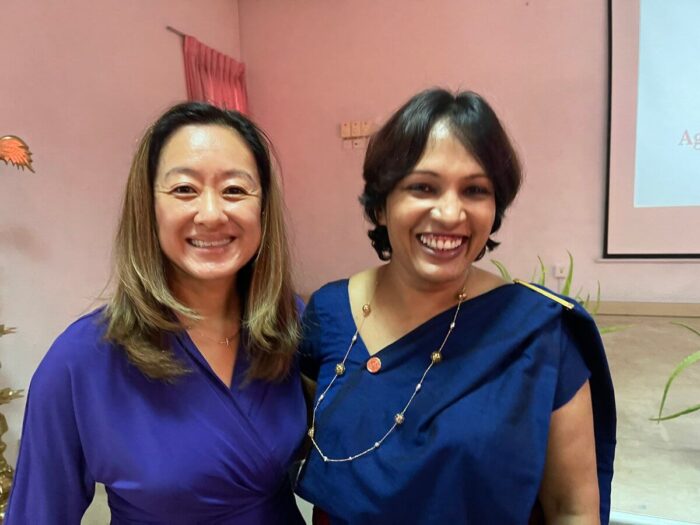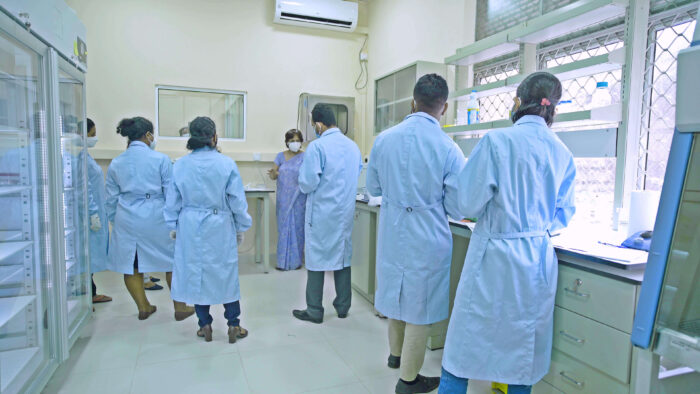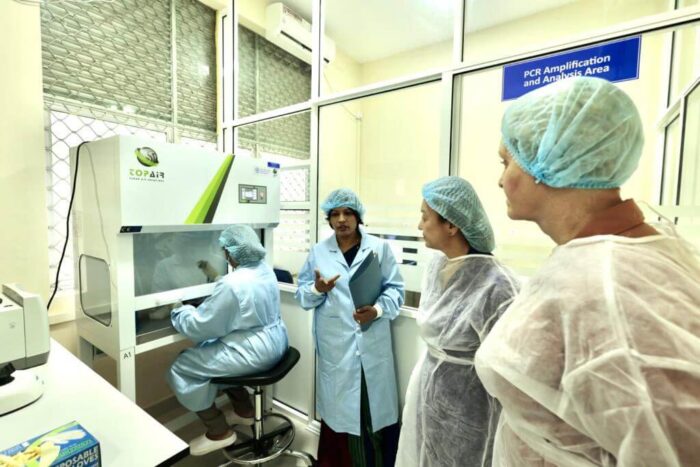Academic research often requires collaboration between stakeholders, from academics to other universities, to public and international organizations. Effective communication – or the lack thereof – could easily make or break a research project that could lead to the next step in scientific advancement. For Professor Pradeepa Bandaranayake, Director of the Agricultural Biotechnology Centre at the Faculty of Agriculture, University of Peradeniya, the Lanka Education and Research Network (LEARN) has been an invaluable platform. Sri Lanka’s National Research and Education Network (NREN) has helped her connect more effectively with all stakeholders, allowing more time, energy, and resources to be spent on her research, whether fingerprinting elephant DNA or developing new IoT solutions for farmers.
The role of an NREN: How LEARN empowers academics

What began as a dial-up connection for a small group of academics to exchange emails has become a massive network connecting higher education institutions across Sri Lanka to facilitate local and international research efforts. As Sri Lanka’s NREN, LEARN provides network-related services connecting all University Grants Commission (UGC) funded state universities, the UGC itself, the Ministry of Education, a few other universities and research institutions, and even the National Science Foundation (NSF) of Sri Lanka.
Over the years, LEARN has secured several regional and international partnerships, which have empowered Sri Lankan academics with invaluable resources. Notably, through these partnerships, the NREN ensured the continuity of higher education in Sri Lanka at the height of the COVID-19 lockdowns. Having all parties consolidated under LEARN’s network to facilitate greater communication has been vital to its success as a platform for collaboration. It has also grown to help academics in several South Asian countries through training programs and building eLearning infrastructure.
A glimpse into the work of the Agricultural Biotechnology Centre

The Agricultural Biotechnology Centre of the Faculty of Agriculture – University of Peradeniya was established to facilitate and strengthen research, capacity building and generate marketable products by exploiting molecular biology and biotechnology. Notably, it is the only institution devoted to Agricultural Biotechnology in Sri Lanka. The centre provides facilities for various disciplines, accommodating research from agriculture to forestry, indigenous medicine, and even pharmaceuticals.
One such research dives into the molecular and biochemical characterization of Sri Lanka Cinnamon and its wild relatives. The analysis seeks to identify new ways to enhance the value of Sri Lankan Cinnamon, a project funded by the National Science Foundation of Sri Lanka. Another includes developing a cost-effective IoT system for farmers to obtain more precise information from the growing environment to help maintain peak conditions for greater agricultural yield. A third example Prof. Bandaranayake shared focused on DNA fingerprinting Sri Lanka’s elephant population, which would help combat poaching and keeping elephants illegally.
The importance of collaboration for academic research

In a conversation with Arteculate Asia, Prof Bandaranayake expressed how crucial collaboration is for successful research efforts. “Nothing can be done in isolation anymore because everything is connected in the world,” she said, revealing the extent of integration and collaboration required behind the scenes for successful academic research. Hence, connection, collaboration, and effective communication between stakeholders are critical. For the Agricultural Biotechnology Centre, the list includes academicians from other universities, both local and overseas, including the likes of Pennsylvania State University, the University of Virginia, and the University of California, Davis.
Elaborating further with an example, Prof. Bandaranayake cited the project to develop IoT sensors for farmers. Such a project requires technical skills to either implement a readily available available on the market or build such a system from scratch. Given that the latter was the cheaper choice, Prof. Bandaranayake collaborated with experts from the Faculty of Engineering at the University of Peradeniya. Further, the project also involved close collaboration with the United Nations and the Japan International Cooperation Agency (JICA), which were funding it. Finally, to reach farmers, the Centre worked closely with the Department of Agriculture and the Department of Export Agriculture to contact farmers directly.
Another example Prof. Bandaranayake elaborated on was collecting the DNA fingerprints of Sri Lanka’s elephant population. She explained that the project was designed upon the request of the Department of Wildlife Conservation to address a national issue. “e don’t have the means, expertise, or resources to collect dung samples from the wild elephants, but the Department does.” Once collected, storing and preserving them in a dedicated cold-storage unit within the department would be a waste of resources. “To avoid this, they provided us with a freezer and let us handle storing the samples, and all the analysis increasing efficiency. It also allows other researchers to benefit from the physical resources and the data collected .”
How LEARN enables effective collaboration in a connected world

In 2020, LEARN expanded its free online Zoom meeting facility, which enabled the continuity of higher Sri Lankan higher education at the height of the pandemic. It’s been extensively noted how the move has benefitted undergraduates, who embraced it wholeheartedly to continue their studies. Prof. Bandaranayake then showcased how LEARN’s facilities help not only students but also academia and researchers.
Crucially, the shift towards online meetings helped prevent correspondence from becoming fragmented and cluttered. For Prof. Bandaranayake, this allowed her to dedicate time and resources to scientific research. It also helped her identify management structures and communicate with relevant stakeholders more efficiently. “With online connectivity, I don’t have to spend nearly ten hours travelling to and from Colombo to Peradeniya for a meeting that lasts only ten minutes,” she added.
The facility by LEARN has also enabled the academics of the Agricultural Biotechnology Centre to share their knowledge with a broader audience. Speaking with Arteculate Asia, she revealed that through LEARN’s Zoom meetings, she has been able to conduct capacity-building programs, share information and collaborate in teaching even with academicians overseas. “We trained a minimum of 300-400 people from different research organizations and universities through this platform, including those working in state departments.”
Further, LEARN also provides a dedicated 2Gbps leased line fiber connection to the University of Peradeniya. This high-speed internet connection is helpful for academics and researchers at the university, including the Agricultural Biotechnology Center. Namely, it aids in efficiently transferring and analyzing large amounts of data related to research projects. Crucially, it also serves as a vital backbone for the collaborative research efforts carried out by the center and its stakeholders, enabling the researchers of the Agricultural Biotechnology Center to advance their research further.
LEARN is supporting Sri Lankan research and scientific advancement
NRENs like LEARN play a crucial role in empowering researchers with their efforts to research. NRENs allow researchers to collaborate more effectively and efficiently with colleagues across different institutions and countries by providing high-speed internet connectivity and access to various digital resources. As we see from the experiences illustrated above by Prof. Bandaranayake of the research carried out by the Agricultural Biotechnology Centre, such collaborations are essential for research efforts to make a successful and meaningful contribution to the world. Ultimately, NRENs like LEARN help accelerates scientific discovery and provide researchers with the critical infrastructure and resources to advance knowledge and address some of the world’s most pressing challenges.
